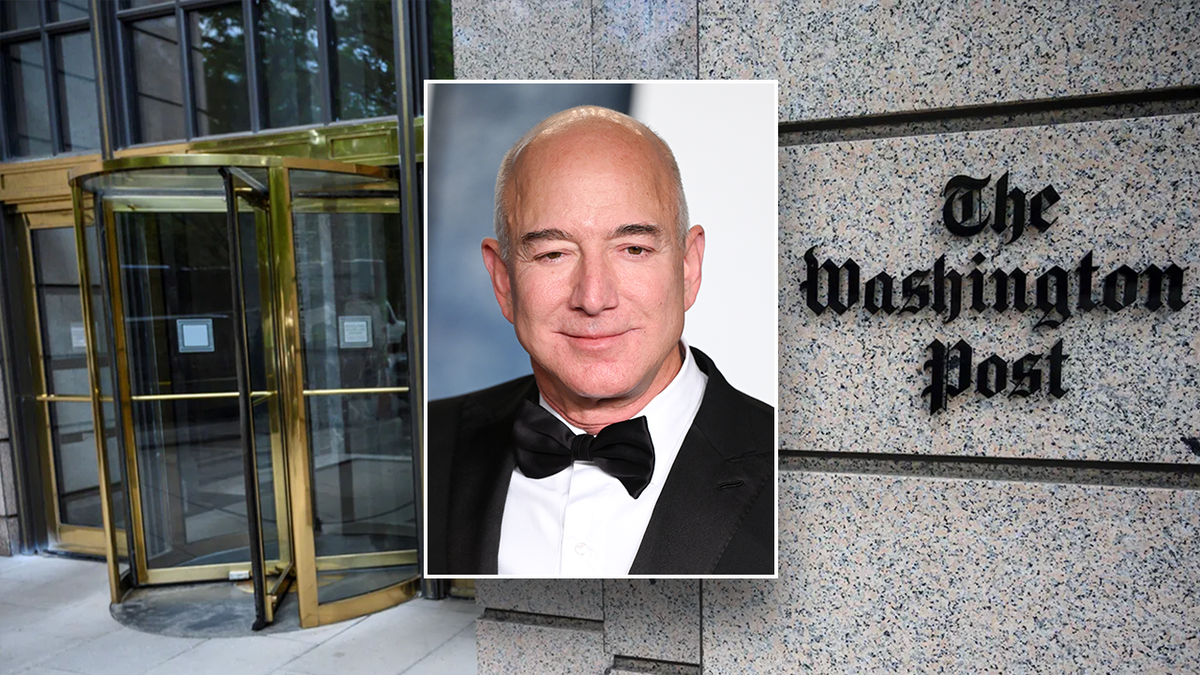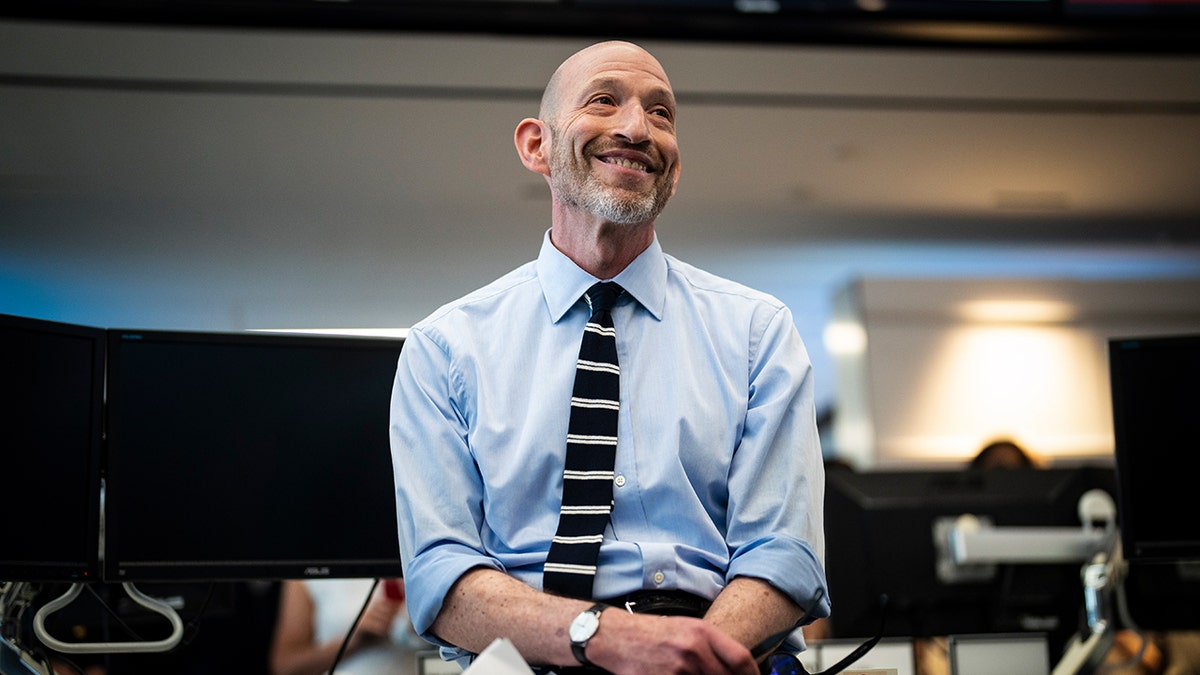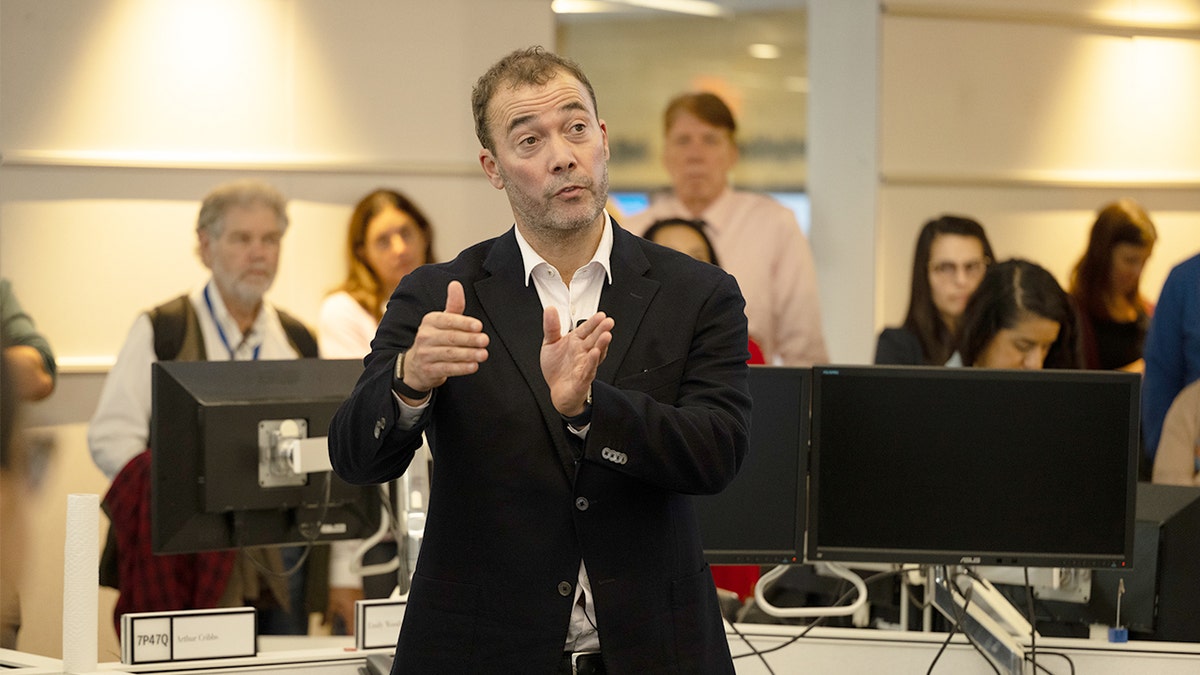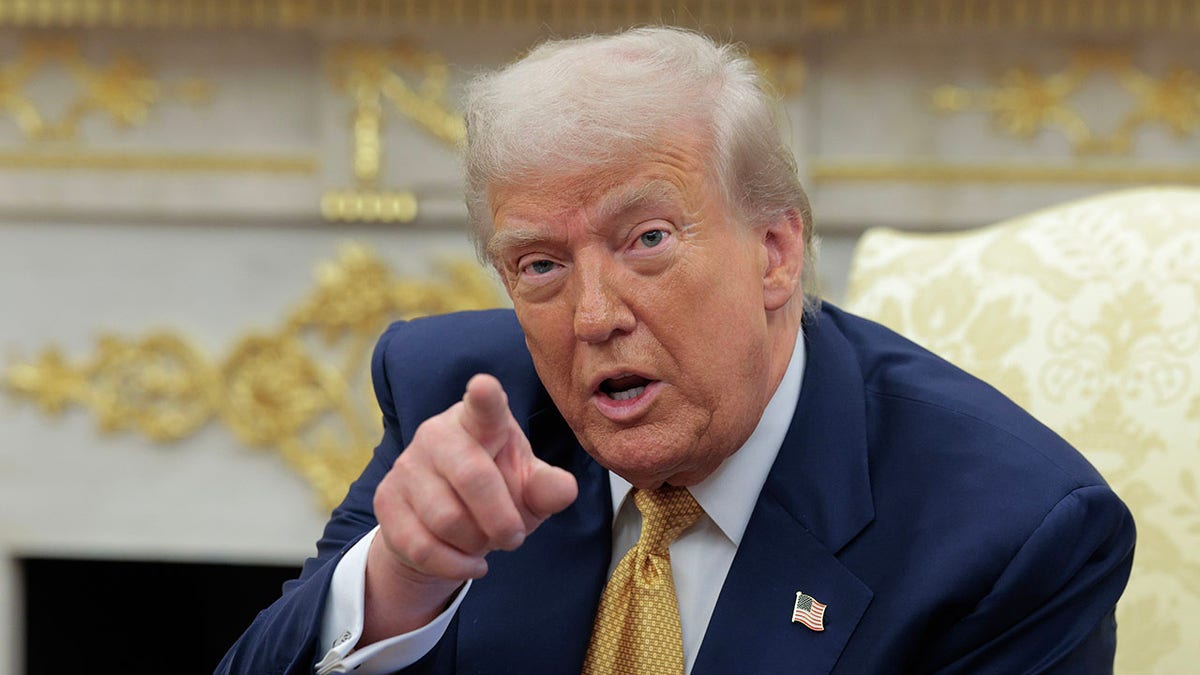NEWYou can now listen to Fox News articles!
EXCLUSIVE – It’s not every day a young journalist is entrusted to completely overhaul the editorial pages of a major newspaper they just joined. But that’s the situation 33-year-old Adam O’Neal has found himself in at The Washington Post.
“I just feel a tremendous responsibility to get this right,” O’Neal told Fox News Digital in his first interview since becoming The Post’s new opinion editor.
O’Neal joined The Post in July after serving as a correspondent for the British outlet The Economist and as an editorial page writer for The Wall Street Journal. He was “immediately intrigued” by the viral mission statement the paper’s billionaire owner, Jeff Bezos, laid out in February, saying The Post’s editorial pages would promote “personal liberties and free markets” going forward and vowed not to publish pieces opposing those principles. Bezos’ edict led to the immediate resignation of O’Neal’s predecessor, David Shipley.
The core principles of personal liberties and free markets were concepts O’Neal thought were “underserved in the current media environment.”
“Being able to start with that, as the North Star, but have the ability to build around that as an intellectual foundation, knowing that there’s still a huge room within free markets and personal liberties for a robust debate about the future of America was hugely appealing to me,” O’Neal said. “And so, when I started speaking to The Post, I was able to be very clear and direct about what I thought this means and we kind of went from there. And I was very delighted to see, as I learned more about the role and the vision for the future, that I was aligned with it and was just very enthusiastic about getting to work on changing this place.”
WASHINGTON POST CEO URGES STAFFERS WHO DON’T ‘FEEL ALIGNED’ WITH PAPER’S NEW DIRECTION TO TAKE BUYOUT
O’Neal calls the current state of the editorial pages a “work in progress” and that reshaping them will take time. That includes redefining the voice of the editorial board, which he says is still developing.
“So one day we might be saying, ‘Hey, you know, the president has a good point about Bagram Air Base,’ right? At the other time, we might praise Democrats who are standing up to [New York City mayoral candidate Zohran] Mamdani and his radicalism. And at the same time, we’ll criticize the Trump administration when we think they get it wrong. So, if anyone thinks that our project here is about one president or just tactical partisan moves, I think that’s really short-sighted, and they’re just not reading or watching or listening to us very closely, frankly,” O’Neal said.
The Post’s pivot, however, doesn’t come without risk. Bezos’ editorial announcement ignited backlash from the left, fueling resignations among staffers and a massive wave of subscription cancellations, fallout similar to when Bezos quashed The Post’s endorsement of then-Vice President Kamala Harris just days before the November election.
JEFF BEZOS’ TENURE AS WASHINGTON POST OWNER IN SPOTLIGHT AS PAPER GRAPPLES WITH LOW MORALE, STAFFER EXODUS

“Our readers are overwhelmingly liberal, right?” O’Neal conceded. “And they’re all overwhelmingly located in blue states. And just a few blue states. And they’re over-represented on the coasts. And so, one way to look at it would be to say, ‘Well, if you’re non-partisan, and you have a highly partisan readership, they may be offended by that.’ And maybe that’s true. But looking forward as I rebuild, I really just see it as an opportunity to expand our reach.”
He continued, “And frankly, a lot of people don’t trust The Post. And they don’t trust the mainstream media more broadly. And so my mission is to hire the kinds of people from throughout the U.S. with different kinds of backgrounds, intellectual diversity, who can appeal and rebuild that trust. And I think that a lot of folks have a poor view of The Post because they don’t feel that they’ve been well served by it.”
“So is it possible that highly partisan readers will no longer like it when we’re not just a lining on one side on every issue? I don’t think that was exactly always the case, but if there are people who had a perception that subscribing to The Post was like a form of activism and that they had to do it to oppose a particular politician or party now that we’re opening up our lands and writing more widely in a nonpartisan way, I don’t know, maybe you’ll lose people that way, but I think the upside of where the growth is by appealing to many more Americans in rebuilding that trust, to me, that’s a pretty clear decision.”
WASHINGTON POST OPINIONS SECTION ANXIOUSLY AWAITS NEW LEADER AFTER JEFF BEZOS PUSHED DAVID SHIPLEY OUT
O’Neal expressed excitement towards building out his team as he aims to find people “outside of the usual places” with different professional backgrounds, floating the idea of hiring veterans or a commodities trader versus solely relying on Ivy League graduates and esteemed economists.
“I have a journalism degree, I’m sorry to say,” O’Neal cheekily admitted. “So some people can kind of manage to get through [journalism school] OK, but we also really just want to cast that wide net, and I think it’ll become, over time, a strategic advantage for us to get the voices and the minds that were overlooked through the traditional way of thinking about journalism.”

What counts for diversity in newsrooms is perhaps subject for debate. Former Washington Post columnist Karen Attiah, who was fired earlier this month for her social media posts about Charlie Kirk’s assassination, said she was “the last remaining Black full-time opinion columnist” and that Washington, D.C. “no longer has a paper that reflects the [diverse] people it serves” (Attiah has since sent a legal threat to The Post, alleging she was wrongly terminated).
While he declined to comment on personnel matters involving Attiah, O’Neal challenged the notion that her ouster means The Post’s editorial team lacks diversity.
“We are going to evaluate every potential hire equally. It’s the quality of their journalism, the background and the knowledge that they can bring to the job,” O’Neal said.
“I don’t think the opinion section is ever going to be in a place where we have quotas, and we’re getting people just to get people because they have some immutable characteristic,” he added. “So, I’ll never hire someone because of their race or gender or anything like that.”
WASHINGTON POST COLUMNIST FIRED OVER SOCIAL MEDIA POSTS AFTER CHARLIE KIRK’S ASSASSINATION
The last several years at The Washington Post have been turbulent between significant financial losses, the exodus of talent that has fled to competing outlets, and low morale in the newsroom. Will Lewis, the British media executive who will soon approach the two-year mark as The Post’s publisher and CEO, has ruffled feathers throughout his tenure at the paper for his leadership style and his brash approach to tough conversations. He famously told staff in June 2024: “People are not reading your stuff. I can’t sugarcoat it anymore.” Lewis would later walk back those remarks.
O’Neal called Lewis a “fantastic journalist” “who’s really damn good at his job.”
“I came into this job with tremendous respect and also confidence in Will, and it’s only grown,” O’Neal said. “He’s been a great mentor, and we’re completely aligned about the direction of travel. And we have the same values when it comes to journalism and where we want to take The Post. Will has been absolutely fantastic to work for.”

O’Neal said he hadn’t read much of the critical reporting on Lewis before joining The Post. He instead relied on colleagues who had worked with Lewis at other British publications. They spoke highly of him.
“I would say he’s met my high expectations — not that it’s incumbent on Will to meet my expectations, but I just think really highly of the guy and, you know, going into the job I did, and I still do,” he said.
The Washington Post’s editorial moves from Bezos have been seen by liberal critics as appeasing President Donald Trump, but the “Democracy Dies in Darkness” paper is in good company. Other legacy news organizations have been accused of bending the knee, like ABC and CBS settling multi-million-dollar lawsuits with the president. Trump’s antagonistic relationship with the press has only ratcheted up during his second term between his administration brawling with The Associated Press over “Gulf of America,” his lawyers taking aim at The New York Times and The Wall Street Journal, and his renewed feud with ABC following Jimmy Kimmel’s comments about the Kirk assassination.
CLICK HERE FOR MORE COVERAGE OF MEDIA AND CULTURE
At a time when his media colleagues are decrying threats to free speech, O’Neal doesn’t seem concerned.
“For me, it’s about our journalism. I don’t really think about any noise outside of that,” O’Neal said. “We’re just providing the most accurate, interesting and compelling journalism for America. And you’d go crazy if you just sat around thinking about how will subscribers or a politician or whoever respond to it. You just have to do what you think is right. And that’s how I think about my journalism.”

Several of The Post’s most high-profile columnists had taken buyouts over the summer (Jonathan Capehart, Catherine Rampell, Philip Bump just to name a few). O’Neal remains optimistic that the staffers who chose to stay are truly onboard with the new mission he is tasked to champion.
“We don’t want people here who are just sort of resigned to the changes and, ‘Oh OK, maybe I can live with this,’ but who are genuinely excited about it,” O’Neal said.
“I just came from an editorial board meeting this morning. It was energetic. We’re having debates, we’re all getting to know each other better. And so everybody that I’m interacting with is fired up. And look, the place is still gonna continue to change, right? We’re still working on restructuring it, changing our workflows,” he continued. “So, it’s ever evolving. But in my corner of The Post, the opinion section, I feel nothing but momentum and great energy. And we’ve been very clear with everybody about the direction of travel, and I’m nothing but excited about it.”
Not only does O’Neal have to implement what he calls The Post’s “distinct voice” on the editorial pages, he also has to bring the opinion section to the 21st century, acknowledging it was “not where it needed to be” in the ever-evolving media landscape.
“Personally, I like print newspapers. I enjoy the tactile experience of reading a paper, how it’s organized. But some people want to get their news through TikTok… Some people prefer YouTube, podcasts,” O’Neal said. “And I think, frankly, we’re playing catch-up because we’ve not done enough on that, and we’re putting a huge amount of resources, time and energy into any piece of journalism we do eventually should be able to be provided to you in the format that you prefer.”
While he says becoming The Post’s opinion editor “is the challenge of my career,” O’Neal insists he’s “having a lot of fun.”
“My goal is to elevate the people around me and to make their careers as fun and interesting as possible, because I know a lot of folks are, you know, not so thrilled with journalists. And I think oftentimes with reason. There’s been a lot of failures in this industry to inform the public. And so I just see this as a chance to get it right,” O’Neal said.
Read the full article here










